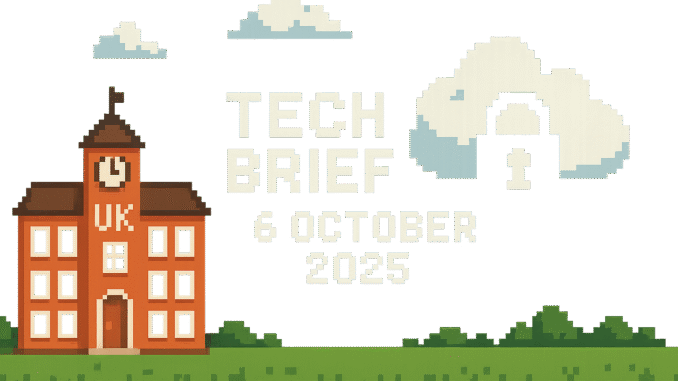
Tech Brief 6 October 2025 brings you a trio of stories that matter right now. These aren’t background headlines. They’re the stuff shaping school mornings, business meetings, and the way we publish and share. If you missed yesterday’s update, you can catch up here before diving in.
Cyber Attacks Hit 60% of UK Secondary Schools Last Year
Cold fact: six out of ten UK secondary schools faced a cyber attack or data breach in the last year. The government’s survey covers ransomware, compromised email accounts, exposed student information, and phishing campaigns dressed up as admin emails. Schools are now prime targets, sometimes even more so than private businesses. No one expects a Year 10 homework server to become a national weak spot, but here we are. Back in the day, the worst a school computer faced was a rude message on the BBC Micro. Now, teachers deal with safeguarding, Wi-Fi mischief, and the looming threat of leaked data. Digital safety isn’t a checklist anymore; it’s a constant, shifting battle. Are we giving schools the tools they need, or just hoping for the best?
Malvern Startup Reinvents Login Security as Cyber Threats Evolve
“What if the Midlands became the new frontline?” That question sparked a Malvern-based startup’s push for stronger online security. Instead of just patching holes, this team built a login system that mixes classic two-factor checks and physical tokens with modern cloud monitoring for suspicious activity. It’s a hands-on approach that feels like a throwback to British home computing, where inventiveness started in the back bedroom. The timing couldn’t be better, as attackers keep raising their game. For users, this could mean fewer password resets and more confidence that their details aren’t up for grabs. There’s something reassuring about a Midlands team taking on global threats. It’s the same creative grit that once put Acorn on the map.
Nearly 1 Billion Salesforce Records Stolen in Cloud Data Breach
A hacker group linked to ransomware attacks on British retailers claims to have stolen nearly a billion records from Salesforce customers. This isn’t a story about nostalgia or old kit. It’s a blunt reminder of the risks in relying on the cloud. Cloud computing promised safety, speed, and convenience. But when something goes wrong, the fallout is massive. We’re not talking about a lost spreadsheet but hundreds of millions of entries exposed. Users and companies bought into the idea of invisible infrastructure. When it breaks, the impact is all too visible. This story connects directly to the school breaches above. Vulnerability isn’t just about outdated hardware; it’s about the foundations of our digital lives. If your important data exists, it probably lives on a server you’ve never seen.
Amazon’s “Enshittification”: From Trusted Storefront to Clickbait Confusion
Here’s a question: when did Amazon stop being fun? The Guardian’s latest analysis calls it “enshittification.” What started as a community-driven marketplace is now an endless maze of ads, algorithmic traps, and AI-generated product pages. Product discovery has become a chore, and fake reviews make trust a guessing game. Once, online shopping was direct. You’d find a real seller, pay for postage, and wait for the van. There was less surveillance, more human quirk, and the occasional dodgy mouse mat. Now, friction is everywhere. Many wonder if these platforms can ever be enjoyable again. It’s not nostalgia; it’s frustration coded into the interface. If you’ve noticed the difference, you’re not alone.
From the Wayback Machine
On This Day: 1982: John Warnock and Charles Geschke founded Adobe Systems in Mountain View, California. Warnock’s creation, PostScript, enabled professional-quality desktop publishing for the first time. Apple’s LaserWriter paired with PostScript brought powerful home printing to everyday users. British designers and publishers relied on these tools for everything from zines to early glossy magazines. If you’ve ever emailed a PDF or printed a flyer, you’re using a legacy that started with two engineers and a lot of ambition.
What This Means
Tech Brief 6 October 2025 is a snapshot of digital trust under pressure. Schools, businesses, and shoppers all face risks that would have sounded far-fetched a decade ago. The question is simple: how much control are we willing to hand over, and at what cost?
Fetch your BBC Micro’s backup disc, just in case. I’ll trust a Midlands engineer before a Silicon Valley promise every time.
Missed yesterday’s Tech Brief? Catch up here

Leave a Reply